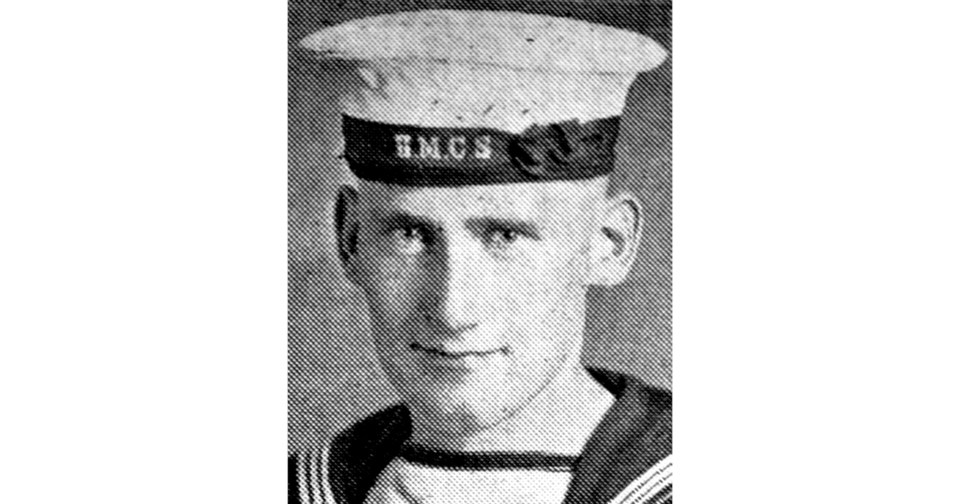HUMBOLDT — Humboldt war hero, Oerlikon [20 mm cannon] Gunner Roman Saretsky, son of Mr.��Karl and Mrs. [Florentina] Saretsky, is on his way home from overseas.
He suffered the loss of one arm during the naval battle off the invasion coast of France at 1:45 in the morning of July 7. He was a gunner on the Canadian Destroyer HMCS Saskatchewan.
Roman Saretsky, not yet 20 years of age, joined the Royal Canadian Navy Volunteer Reserve on June 10, 1942. He went overseas in March 1943 and had been on the H.M.C.S. Saskatchewan ever since. He had seen action in other engagements previous to the one on July 7. When he was wounded by enemy gunfire, the medical officer saved his life by amputating his arm on the mess deck table during the engagement.
Two brothers are serving overseas, Cpl. Emil Saretsky and Pte. Leonard Saretsky, both with the Canadian Army in Italy.
��
Story of the battle
The following is a press report of the battle of July 7:
AN EAST COAST PORT, Aug. 11. — Gun for gun and ship for ship, the Royal Canadian Navy all but wiped out a German squadron in a July 7 naval battle, details of which were revealed for the first time at this naval base today.
Four Canadian destroyers battled an equal fleet of Hitler's heavily armed trawlers off the enemy-held coast of France and when the smoke of battle cleared three German ships were sunk or destroyed and the fourth had fled. On the Canadian ships two men were killed and 29 wounded.
It was an all-Canadian show, the first time in history that our destroyers, standing alone, have fought an enemy fleet in a surface battle.
The story of the victory, shared by the veteran destroyers Qu'Appelle, Skeena, Restigouche and Saskatchewan was revealed today by the Saskatchewan's commander, Lt.-Cmdr. Allen H. Easton, D.S.C., of Halifax and Montreal, and several members of his crew.
Right under the noses of shore guns to within two miles of the enemy-held coast, near the U-boat base at Brest, the Canadian flotilla sailed to attack the German ships. The action was fought under a bright moon but in heavy seas. It began at 1.46 a.m. and was over in 50 minutes. With every gun blazing, the Canadian destroyers chased the Germans in a running fight.
For most of the Canadians it was their baptism of fire from a surface force and they conducted themselves "creditably" the Saskatchewan's commander said.
“They fired everything at us but the kitchen sink and sometimes I thought that had come over, too,” said his young gunnery officer, Lt. Alfred W. Everett of Winnipeg. “I have never seen such a tremendous amount of tracer fire as I did that night.”
Because of their light armament the Canadians had to close in to 800 yards to attack the flotilla of four heavily armed trawlers, making the destroyers dangerously vulnerable to shore batteries only two miles away. The trawlers were believed escorting a fleet of U-boats out to sea.
The Germans admitted the loss of three trawlers and there were casualties and slight damage aboard three of the Canadian destroyers. Saskatchewan had one man killed, Leading Seaman Doug Leech of Calgary, and six wounded; Qu'Ap-pelle had one killed and 16 wounded Skeena, seven wounded. There were no casualties or damage aboard the Restigouche.
��
Accosted by enemy
H.M.C.S. Qu'Appelle, commander Sandy MacKillop, R.N., was leading the sweep which had taken the flotilla well into the approaches to the harbor of Brest, in the early morning of July 7. Astern, in line, were Saskatchewan, Skeena and Restigouche. At 1.45 a.m. Qu'Appelle was challenged by the enemy, who apparently thought he was accosting a friendly ship. The captain replied with star shells, lighting up the scene, and immediately both sides opened up with everything they had.
Quicker on the draw, the Canadians scored an early advantage and closing to 800 yards, pumped broadside after broadside into the Germans. With the enemy trawlers blazing from stem to stern, the Jerries stuck to their guns, Saskatchewan officers said, and went down with their ships. No survivors were picked up.
The medical officer is Surgeon Lieut. Doug Keeley, R.C.N.R. He saved the life of Oerlikon Gunner Roman Saretsky of Humboldt, by amputating his arm on the mess deck table during the engagement.
��
Editor's Note: according to an ,��Saretsky lived until 2007. He was 82.��




